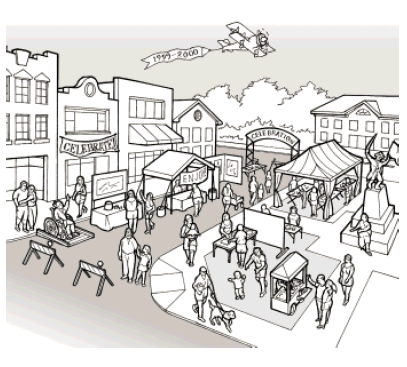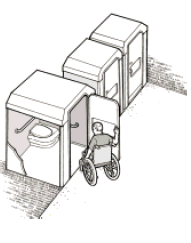K) Temporary Events.
The ADA applies to both temporary and permanent services, programs, or activities of a town. Facilities and structures that are built or altered for temporary use must comply with the ADA Standards (except for construction trailers). In addition, the policies and operations for the event must meet the nondiscrimination requirements of the ADA. When planning temporary events such as a town festival or concert, the town should review ADA title II requirements 2 and the ADA Standards. The Standards can provide guidance to help event planners place temporary accessible parking spaces in appropriate locations, provide an accessible route throughout the site, and provide other accessible features for food service, toilet facilities (including accessible portable toilets), assembly area seating, public telephones, etc., where such elements or facilities are provided for the public. It is very important to consider accessibility requirements when the event is in the planning stage so that accessible facilities can be identified and incorporated in a manner that does not require extensive construction or last-minute modifications.

A town fair that was planned to provide accessible programs, services and activities.
Selected Accessible Features of Town Fair
• temporary curb ramp added where needed to provide an accessible route
• booths and vendors located on an accessible route
• sign language interpreters available for selected performances and programs
• accessible parking, accessible transit drop offs and stops (if provided) and an accessible route from these areas to the fair is provided
Effective communication requirements also apply to temporary events. It may be necessary to provide qualified sign language interpreters or other auxiliary aids and services as requested, such as print material in a large-print format or on computer disk. A town may choose when to provide interpreters and publicize a schedule for interpreters and other auxiliary aids and services. It should also provide auxiliary aids or services in response to individual requests, unless to do so would result in undue financial and administrative burdens. Promotional material for a temporary event should explain how the public can request a particular auxiliary aid or service and be informed of when specific auxiliary aids and services may be available.

When portable toilets are provided, at least one at each location must be accessible.
2 Private vendors and contractors should follow the ADA title III regulations which cover goods and services provided by private companies. For more information, see the ADA Guide for Small Businesses.

User Comments/Questions
Add Comment/Question